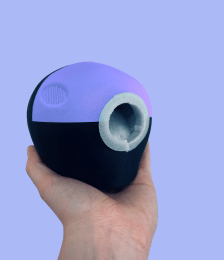Mamilla: A Breastfeeding Educational Device
Follow articleHow do you feel about this article? Help us to provide better content for you.
Thank you! Your feedback has been received.
There was a problem submitting your feedback, please try again later.
What do you think of this article?
Objectives
In the UK, only 1% of mothers exclusively breastfeed for the World Health Organisation's recommended six months. This is often due to latching difficulties resulting in pain and unnecessary strain on the feeding experience in its crucial early stages.
The device that we are developing named Mamilla aims to guide mothers through positioning to achieve a breastfeeding latch that is both comfortable and optimised for them. We intend to alleviate some of the workload on lactation consultants, allowing them to prioritise higher-risk and less common cases, ultimately enhancing the quality of care. Mamilla’s overarching objective is to empower mothers by providing them with accessible support that they need to create a positive breastfeeding experience for both mother and child. It's important to note that our aim is not to dictate individual preferences in how to feed one's child, nor do we seek to intervene in cases where medical professionals deem alternative feeding methods to be appropriate. Rather, we strive to allow the 8 in 10 mothers who wish to continue breastfeeding to feel empowered and capable to do so.
Whilst, our core values centre on empowerment and support for new mothers, we also recognise the importance of financial viability. Additionally, the long-term potential health benefits of breastfeeding cannot be overstated. Breastfeeding not only reduces mothers' risks of ovarian cancer, breast cancer, obesity, and cardiovascular disease but also decreases infants' risk of similar issues in adulthood. If universal breastfeeding was achieved in the UK the health benefits alone could save the NHS £50 million annually.
Methodology
Mamilla was initially developed over six months as part of an Industrial Design module at Imperial College London’s Dyson School of Design Engineering. The first three months involved extensive user research. We then went on to concept development based on insights derived from the identified pain points. Next, using the remaining time we, through six iterations, manufactured a 3d printed prototype and silicone insert with functioning electronics (sourced from RS). After the marking of this project, we went on to win the DESIRE (Design Engineering Selected Innovation REcognition) Award from the department for the cohort’s most innovative project.
Since then we have also been accepted onto an accelerator program hosted by Imperial’s Enterprise Lab where we hope to gain the business understanding and connections that are required to launch an idea into the start-up world.
https://www.imperialenterpriselab.com/programmes/we-innovate/
We are currently seeking guidance and funding to further develop Mamilla to a stage where it is ready for user testing! If you believe you can offer assistance or would like to follow our journey, please connect with us at https://www.linkedin.com/company/mamilla-breastfeeding.
Meet The Team
We are a team of six third-year Design Engineering Students from Imperial College London!
Product
With the £300 award from RS Components, we will allocate funds towards general components that are integral to the functionality of our educational breastfeeding device. These components will contribute to accurate sensing and an intuitive user interface, ensuring the device is user-friendly and comfortable. Our focus will be on the sensory feedback mechanism which is essential for guiding new mothers to experiment with optimal latch techniques.
In compliance with our commitment to quality and safety, we will source materials that uphold these values enhancing the product’s performance. The specifics of the components remain broad to protect our intellectual property, but rest assured, every element that is selected is aimed at enhancing the breastfeeding experience and supporting maternal health.
Next Steps
With the foundation set and the initial funding in place, our next steps are to propel the educational breastfeeding device into the next phase of development. This entails:
- User Testing Preparation: we plan to establish a framework for user testing to validate our design principles and gather essential feedback, ensuring our product meets the real-world needs of new mothers.
- Prototype Refinement: iterative enhancements to our prototype will be made to incorporate feedback and improve functionality, user interface, and comfort.
- Regulatory Pathway: we want to identify and understand the regulatory requirements to ensure our product complies with health and safety standards.
- Partnerships and Collaborations: seeking partnerships with maternal health organisations will be crucial to gain valuable insights and strengthen the product’s reach and effectiveness.
- Intellectual Property Protection: we will take steps to protect our intellectual property, ensuring our innovative solutions are safeguarded as we move closer to market readiness.
Our journey is guided by a vision to support maternal health and empower mothers, and we anticipate navigating these steps with the commitment and innovation that won us the RS Components prize.





Comments